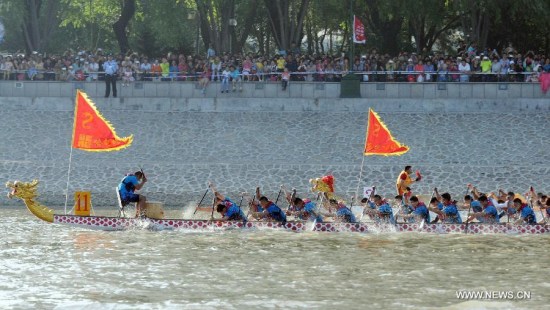
Participants compete in a dragon boat race to mark the Dragon Boat Festival, in Harbin, capital of northeast China's Heilongjiang Province, June 20, 2015. (Photo: Xinhua/Liu Yang)
As the dragon boat racing season once again has China cheering the action, many rowers in Zhucun Village of the southern Guangzhou City have been struggling as much to keep the water from splashing on their bodies as to power their boats ahead.
"The water is too dirty. I saw a dead mouse in there once, and every time I think of it, I feel itchy all over," said one student rower from the nearby Sun Yat-sen University.
Racing of traditional longboats is the centerpiece celebration of the Dragon Boat Festival, which falls on the fifth day of the fifth month of the lunar calendar, commemorating the death of Qu Yuan, a poet/minister from the Warring States period who committed suicide in the Miluo River in central China.
The tradition originates from the fishermen who raced to save the fallen statesman.
In Guangzhou, racing can last the whole lunar month of May, as villages host races in a relay style.
In Zhucun, more than 80 dragon boats from different villages showed up on Saturday, the day of the festival. Decorations, fireworks and drums brought pomp to the occasion, but the dirty water truly dampened the party atmosphere as public awareness of river pollution grows across the country.
"Look at these guys; they must be dummies to row in such stinky water," one tourist mumbled.
For 49-year-old Pan Jianming, dragon boating on his home river is no dumb act. A rower since the age of 14, he is the organizer of this year's event.
"Dragon boat racing is a celebratory reminder of our culture and our roots. It is an exchange between villages and an important occasion for family gatherings," he said.
He admits, however, that ceremonial practices have had to change as it has dawned on people how harmful polluted water can be. "Wherever the dragon boat went, people used to scoop up the water it had been through to wash babies, to ward off evil or misfortune. Nobody uses water from the river on babies anymore. We use bottled water for that purpose," Pan said.
Some elderly locals still insist on honoring the "sacred water" ceremony, but much more cautiously. At the river bank, dozens of seniors could be seen scooping water into bowls and spilling a few drops of the rust-colored stuff onto their feet on Saturday.
"You see, only us old men are doing this," said Chen Julin, 66, as he drew water from the river. "Contaminated water won't drive away disease. Many people even worry about catching disease from it in fact."
Pan Jianming used to feel ashamed when racers from elsewhere came to Zhucun. "But when we went to participate in other races, the water there was no better than ours!" he said.
Pan said most waterways are clean enough for dragon boat racing except for some larger rivers branching directly from the Pearl River.
As of the end of 2014, Guangzhou City Environmental Protection Bureau categorized 16 local rivers and two reservoirs as contaminated, with excessive phosphorus or other chemicals.
China has five grades for surface water. The average river quality in Guangzhou barely meets the second-worst grade, "for common industrial use only, not for direct contact with human bodies".
In the last decade, the city has spent heavily to improve river water quality. One hundred billion yuan (16.1 billion U.S. dollars) was earmarked for combating river pollution from 2013 to 2016. It's obviously not been enough to keep pace with increased industrial waster water emissions.
Ms Zhong has been living along the Yangji waterway in eastern Guangzhou since the 1980s. "When we moved here, it was a nice place to go swimming. But by 2000, it was so stinky that we had to close the window," she said.
After a massive cleanup, the stinky smell has gone but Yangji is still off limits to swimmers.
The Guangzhou government has announced it will adopt the national "Head of the River" scheme, holding one official responsible for each river.
Dragon boaters have their fingers crossed on the effectiveness of such measures.
"Dragon boat racing stems from our love of the water, but now we're afraid of the water. This is ironic. I just hope I can race in cleaner water soon," said Chen Haolin, 21.
















































